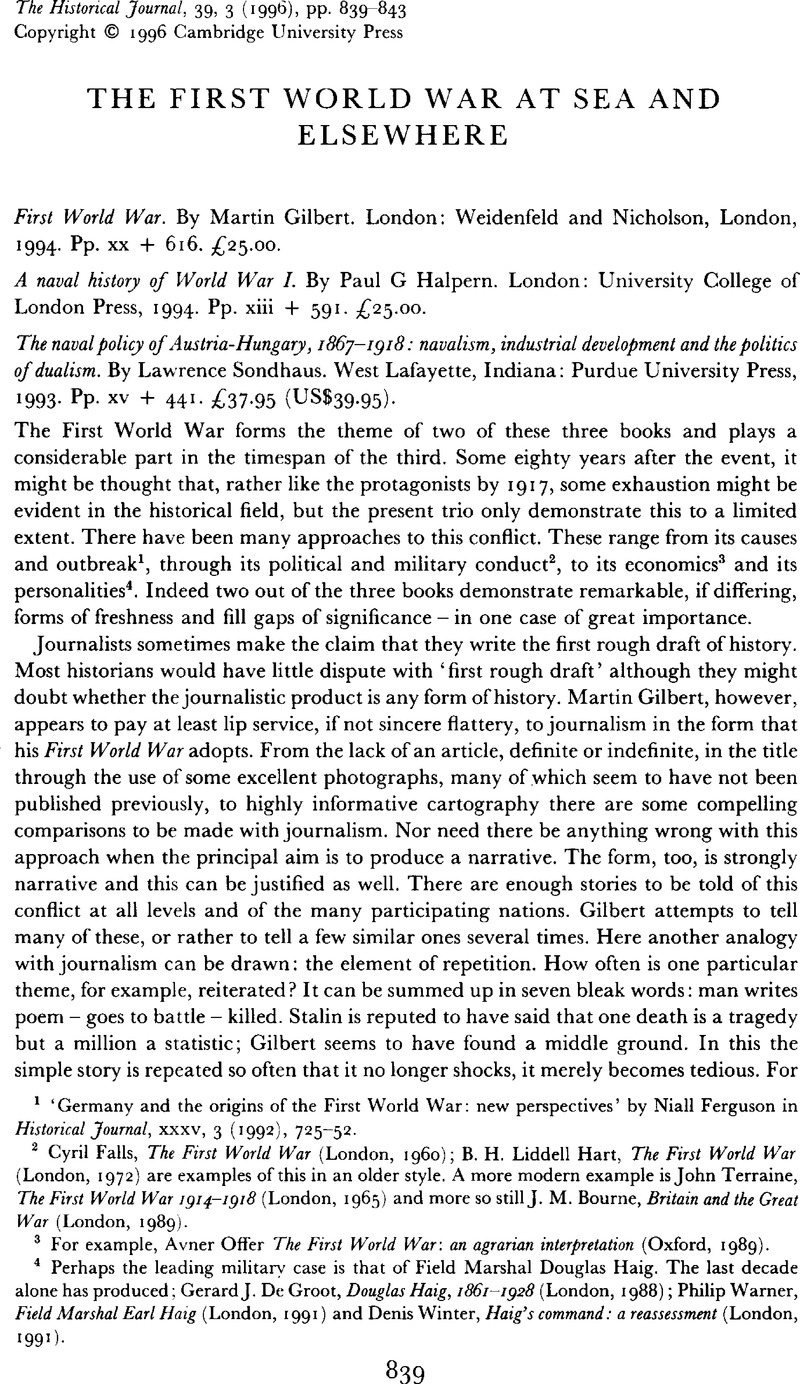No CrossRef data available.
Article contents
The First World War at sea and elsewhere
Published online by Cambridge University Press: 11 February 2009
Abstract

- Type
- Review Articles
- Information
- Copyright
- Copyright © Cambridge University Press 1996
References
1 ‘Germany and the origins of the First World War: new perspectives’ by Niall, Ferguson in Historical Journal, xxxv, 3 (1992), 725–52.Google Scholar
2 Cyril, Falls, The First World War (London, 1960)Google Scholar; Hart, B. H. Liddell, The First World War (London, 1972)Google Scholar are examples of this in an older style. A more modern example is John, Terraine, The First World War 1914–1918 (London, 1965)Google Scholar and more so still Bourne, J. M., Britain and the Great War (London, 1989).Google Scholar
3 For example, Avner Offer The First World War: an agrarian interpretation (Oxford, 1989).Google Scholar
4 Perhaps the leading military case is that of Field Marshal Douglas Haig. The last decade alone has produced; Gerard J. De, Groot, Douglas Haig, 1861–1928 (London, 1988)Google Scholar; Philip, Warner, Field Marshal Earl Haig (London, 1991)Google Scholar and Denis, Winter, Haig's command: a reassessment (London, 1991).Google Scholar
5 Gilbert, pp. 311, 251. Much of the account of the naval battle is given over to Vera Brittain's reaction to it.
6 Gilbert, pp. 376, 458.
7 Gilbert, p. 346; (Lord) Arthur, Salter, Allied shipping control (Oxford, 1922)Google Scholar and Memoirs of a public servant (London, 1961).Google Scholar
8 See, for example, his Routledge atlas of the First World War (London, 1994)Google Scholar and Soviet history atlas (London, 1979).Google Scholar
9 Len, Deighton, An expensive place to die (London, 1969), p. 108.Google Scholar
10 ‘Comparative Naval History’ in Hattendorf, John B (ed.) Doing Naval History (Newport Rhode Island, 1995).Google Scholar
11 Full length works are The Mediterranean naval situation, 1908–1914 (Cambridge, 1970)Google Scholar and The naval war in the Mediterranean, 1914–1918 (London and Annapolis, 1987)Google Scholar as well as ‘The Anglo-French-Italian Naval Convention of 1915’ in Historical Journal, XIII no. 1 (March 1970), 106–29.Google Scholar
12 Halpern, p. 60.
13 Halpern, p. 180.
14 Halpern, pp. 205, 218, 226.
15 Halpern, chapters 5 & 12; and Sondhaus, chapters 7–9.
16 Halpern, p. 393.
17 Halpern, p. 373.
18 For a study of even greater scope, both temporally and in subject see Jan, Glete, Navies and nations: warships, navies and state building in Europe and America, 1500–1860 (Stockholm, 1993)Google Scholar and review of it in Historical Journal, XXXVIII, 3 (1995), 695–705.Google Scholar
19 The leading work of recent years must be Sumida's, Jon T.In defense of naval supremacy: finance, technology and British naval policy, 1889–1914 (Boston, 1989)Google Scholar. See also the contributions made by Goldrick, Rosenberg and Sumida in Hattendorf, pp. 22, 25.
20 Hattendorf, chapter 6.
21 Sondhaus, pp. 4, 324.
22 Perhaps the best example is a military rather than a naval one. During the First World War, there was a general German perception that Austro-Hungarian troops were poor, but they appeared to perform perfectly satisfactorily, very efficiently even, under German officers. Shanafelt, Gary W, The secret enemy: Austria-Hungary and the German alliance, 1914–1918 (Boulder, Colorado, 1985), p. 44Google Scholar. Even when some allowance is made for German bias, this suggests strongly that the Austrian problem was more related to organization and leadership rather than being inherent in the ethnic mix.
23 Sumida and Rosenberg in Hattendorf, p. 25. Although providing a useful aide memoire, this list can perhaps be criticised for de-emphasizing politics for the sake of alliteration. On the other hand, perhaps it is all politics.
24 Sondhaus, p. 218.
25 Sondhaus, p. 45.
26 Sondhaus, p. 152.
27 Sondhaus, p. 199.


